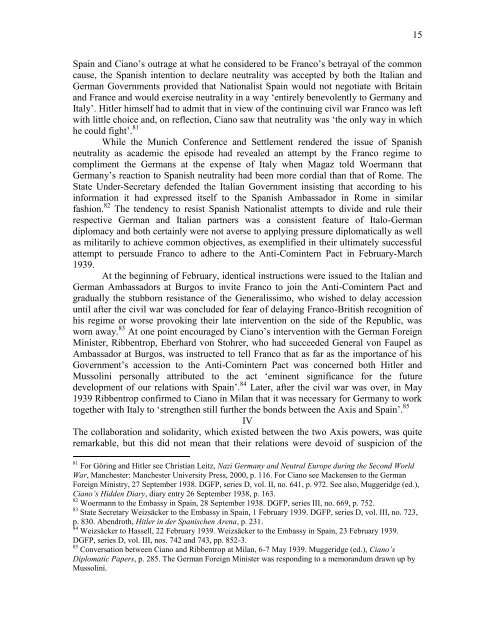Stone, G. (2009) Italo-German collaboration and the Spanish Civil ...
Stone, G. (2009) Italo-German collaboration and the Spanish Civil ...
Stone, G. (2009) Italo-German collaboration and the Spanish Civil ...
You also want an ePaper? Increase the reach of your titles
YUMPU automatically turns print PDFs into web optimized ePapers that Google loves.
Spain <strong>and</strong> Ciano‟s outrage at what he considered to be Franco‟s betrayal of <strong>the</strong> common<br />
cause, <strong>the</strong> <strong>Spanish</strong> intention to declare neutrality was accepted by both <strong>the</strong> Italian <strong>and</strong><br />
<strong>German</strong> Governments provided that Nationalist Spain would not negotiate with Britain<br />
<strong>and</strong> France <strong>and</strong> would exercise neutrality in a way „entirely benevolently to <strong>German</strong>y <strong>and</strong><br />
Italy‟. Hitler himself had to admit that in view of <strong>the</strong> continuing civil war Franco was left<br />
with little choice <strong>and</strong>, on reflection, Ciano saw that neutrality was „<strong>the</strong> only way in which<br />
he could fight‟. 81<br />
While <strong>the</strong> Munich Conference <strong>and</strong> Settlement rendered <strong>the</strong> issue of <strong>Spanish</strong><br />
neutrality as academic <strong>the</strong> episode had revealed an attempt by <strong>the</strong> Franco regime to<br />
compliment <strong>the</strong> <strong>German</strong>s at <strong>the</strong> expense of Italy when Magaz told Woermann that<br />
<strong>German</strong>y‟s reaction to <strong>Spanish</strong> neutrality had been more cordial than that of Rome. The<br />
State Under-Secretary defended <strong>the</strong> Italian Government insisting that according to his<br />
information it had expressed itself to <strong>the</strong> <strong>Spanish</strong> Ambassador in Rome in similar<br />
fashion. 82 The tendency to resist <strong>Spanish</strong> Nationalist attempts to divide <strong>and</strong> rule <strong>the</strong>ir<br />
respective <strong>German</strong> <strong>and</strong> Italian partners was a consistent feature of <strong>Italo</strong>-<strong>German</strong><br />
diplomacy <strong>and</strong> both certainly were not averse to applying pressure diplomatically as well<br />
as militarily to achieve common objectives, as exemplified in <strong>the</strong>ir ultimately successful<br />
attempt to persuade Franco to adhere to <strong>the</strong> Anti-Comintern Pact in February-March<br />
1939.<br />
At <strong>the</strong> beginning of February, identical instructions were issued to <strong>the</strong> Italian <strong>and</strong><br />
<strong>German</strong> Ambassadors at Burgos to invite Franco to join <strong>the</strong> Anti-Comintern Pact <strong>and</strong><br />
gradually <strong>the</strong> stubborn resistance of <strong>the</strong> Generalissimo, who wished to delay accession<br />
until after <strong>the</strong> civil war was concluded for fear of delaying Franco-British recognition of<br />
his regime or worse provoking <strong>the</strong>ir late intervention on <strong>the</strong> side of <strong>the</strong> Republic, was<br />
worn away. 83 At one point encouraged by Ciano‟s intervention with <strong>the</strong> <strong>German</strong> Foreign<br />
Minister, Ribbentrop, Eberhard von Stohrer, who had succeeded General von Faupel as<br />
Ambassador at Burgos, was instructed to tell Franco that as far as <strong>the</strong> importance of his<br />
Government‟s accession to <strong>the</strong> Anti-Comintern Pact was concerned both Hitler <strong>and</strong><br />
Mussolini personally attributed to <strong>the</strong> act „eminent significance for <strong>the</strong> future<br />
development of our relations with Spain‟. 84 Later, after <strong>the</strong> civil war was over, in May<br />
1939 Ribbentrop confirmed to Ciano in Milan that it was necessary for <strong>German</strong>y to work<br />
toge<strong>the</strong>r with Italy to „streng<strong>the</strong>n still fur<strong>the</strong>r <strong>the</strong> bonds between <strong>the</strong> Axis <strong>and</strong> Spain‟. 85<br />
IV<br />
The <strong>collaboration</strong> <strong>and</strong> solidarity, which existed between <strong>the</strong> two Axis powers, was quite<br />
remarkable, but this did not mean that <strong>the</strong>ir relations were devoid of suspicion of <strong>the</strong><br />
81 For Göring <strong>and</strong> Hitler see Christian Leitz, Nazi <strong>German</strong>y <strong>and</strong> Neutral Europe during <strong>the</strong> Second World<br />
War, Manchester: Manchester University Press, 2000, p. 116. For Ciano see Mackensen to <strong>the</strong> <strong>German</strong><br />
Foreign Ministry, 27 September 1938. DGFP, series D, vol. II, no. 641, p. 972. See also, Muggeridge (ed.),<br />
Ciano’s Hidden Diary, diary entry 26 September 1938, p. 163.<br />
82 Woermann to <strong>the</strong> Embassy in Spain, 28 September 1938. DGFP, series III, no. 669, p. 752.<br />
83 State Secretary Weizsäcker to <strong>the</strong> Embassy in Spain, 1 February 1939. DGFP, series D, vol. III, no. 723,<br />
p. 830. Abendroth, Hitler in der Spanischen Arena, p. 231.<br />
84 Weizsäcker to Hassell, 22 February 1939. Weizsäcker to <strong>the</strong> Embassy in Spain, 23 February 1939.<br />
DGFP, series D, vol. III, nos. 742 <strong>and</strong> 743, pp. 852-3.<br />
85 Conversation between Ciano <strong>and</strong> Ribbentrop at Milan, 6-7 May 1939. Muggeridge (ed.), Ciano’s<br />
Diplomatic Papers, p. 285. The <strong>German</strong> Foreign Minister was responding to a memor<strong>and</strong>um drawn up by<br />
Mussolini.<br />
15

















